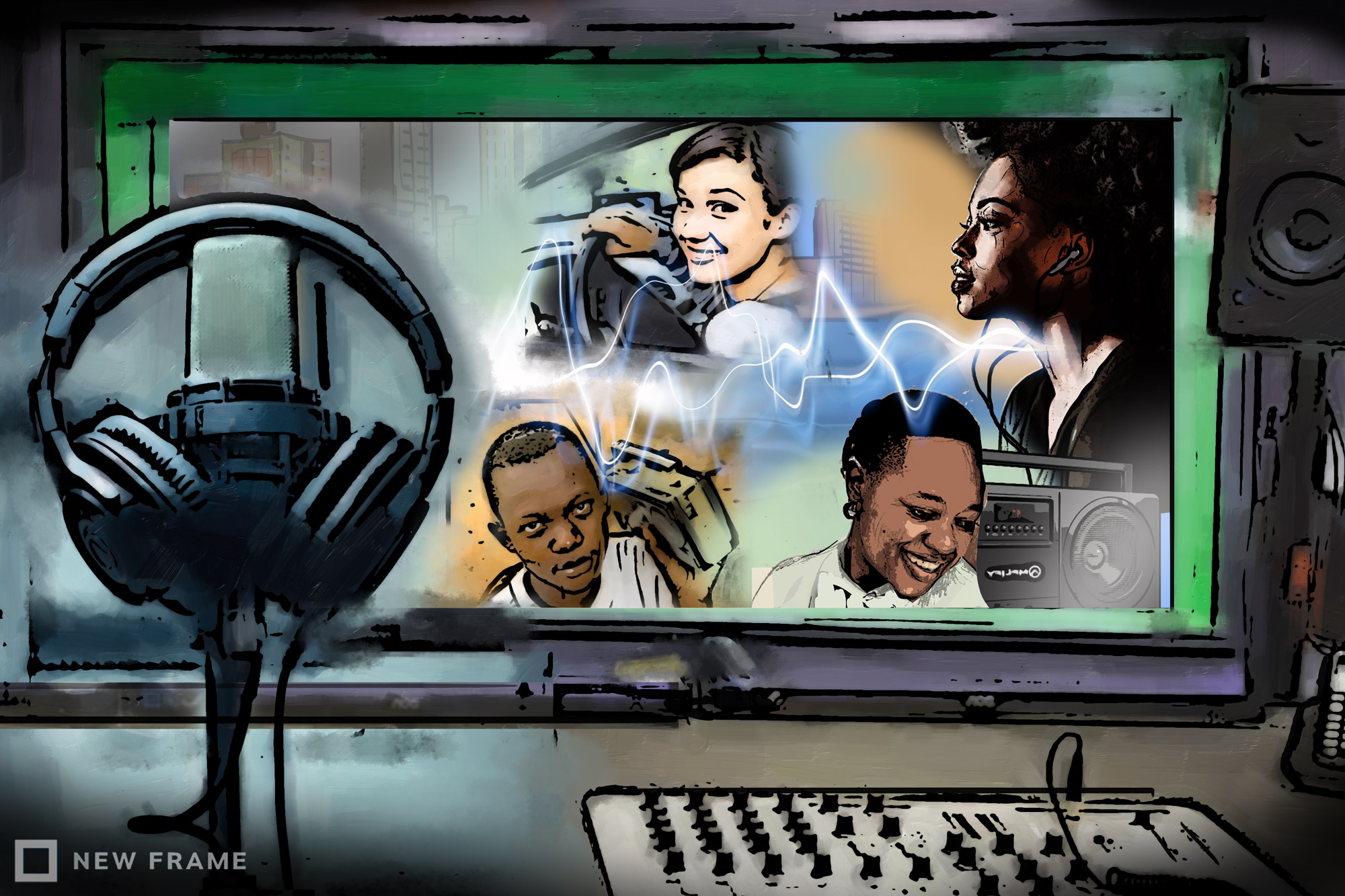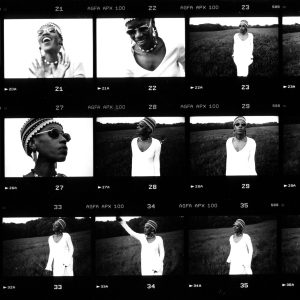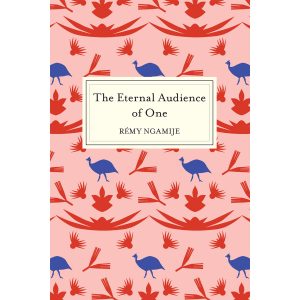The cultural impact of The Eusebius McKaiser Show
McKaiser’s show at Radio 702 became a home for many, a place to question and deeply engage with difficult aspects of South African society while shaping public culture.
Author:
2 July 2020

On Friday 19 June, Eusebius McKaiser spoke on Radio 702’s microphones for the last time as an anchor.
Dynamic cultural phenomena hold such a grip on our imaginations and lives that their influence seems ubiquitous during their circulation. As a teenager, there was the explosive pleasure of a Brenda Fassie stadium concert or the joy of experiencing VMash’s exuberance on television. Their specialness was in addition to being talented or eccentric, because many other public figures were. They stood out because they changed something about the time with consequences that stretched into the future, not just how we felt then. They indelibly shaped an age and us, its people.
Njabulo Ndebele has written about how Brenda Fassie, through her music and persona, could consolidate “a sense of musical space” and “culture as social affirmation” ensuring “symbols changed in the process”. He understands the connection between historical context, material conditions and symbolic effects that create public culture as being more than just about creative arts.
So, in a different context, we understand that Serena Williams is a cultural phenomenon, not just a sporting genius. This is why it will seem inadequate to hear Brenda described as a musician or addict, and Serena a tennis champion, in the future. It is not because those things are untrue; it is because to influence public culture is to exceed the categories. Eventually, music careers, television show contracts and superlative athletic careers end. Time passes and memories fade. Years later, what remains is a lingering feeling of the specialness of a figure or body of work. The sense of influence oscillates – sometimes clearly seen, at other times almost imperceptible, and at all times still present.
Related article:
Eusebius McKaiser’s last show on Radio 702 marked a significant moment because of what McKaiser had infused into the public culture of our times. He had exceeded the category of popular talk show host.
Public culture’s reach and effect cannot be found in the number of people who tune into a station, or in maps that show how radio is the most pervasive media platform in the country. It is not expressed in the cult of celebrity even. These are important, but not enough.
The scholar of public culture, however, is interested in more than how they excel in their realm. Was McKaiser successful as a talk radio host? Scholars and critics of radio will likely argue in the affirmative. The show shaped everyday dialogue and, with it, the culture of our time. It relied on techniques that create specific kinds of conversations and channel these into further possibilities. McKaiser did not invent the genre or tradition of talk radio, but he did something very special with it that demands pause and reflection.
Illuminating our time and honouring the difficult
By the time McKaiser joined Radio 702, after leaving Power FM, the station was in its 30th year as a talk radio station, having been a youth music station prior. The Eusebius McKaiser Show on 702 illuminated and altered something about our time and society. It was not just a popular show, but one with a crucial imprint on public culture that kept difficult aspects of South African society permanently in mind.
For one, he did not just occasionally show us that violence was a feature of our society. He demonstrated the many ways in which it is one of our vernaculars, insisting that we take this seriously without being incapacitated by it.
He modelled an unwavering determination to undoing violence in wide-ranging gestures. Whether he held fire to the feet of employers who expelled women who spoke out about sexual harassment, or refused to accept bureaucratic doublespeak while people were trapped in poverty, he was firm. On his show, he was unapologetic about naming white supremacist power no matter how hard it masked itself, and would not look away from the crisis of rape and the systemic brutalisation of children in boys’ schools. McKaiser was consistent.
Related article:
South Africans have developed many ways to avoid these conversations while pretending to talk about violence. McKaiser is not one for easy ways out. He is interested in a different, reflective masculinity. As a result, he can speak about being raped as a child and about masculine privilege as a man in patriarchal society at the same time without betraying himself or avoiding an analysis of power. He constantly revisited the work of activists and scholars who work on violence as part of his ongoing commitment to the end of violence.
As the late great Stuart Hall wrote in the essay CLR James: A Portrait: “Honour is accorded by taking … ideas seriously and debating them, extending them, quarelling with them, and making them live again.”
It is not only in his approach to violence that he honoured the difficult. While there was much joy in witnessing a black gay man hosting a show, in the ways he chose to surface this aspect of his life McKaiser knew that the fact of his intersecting identities taking up space was not enough.
Representation is about more than the obviously political and taking up space. The fact of his sexual identity was a resource in much the same way that his class mobility or the double consciousness lens of being a small-town, Eastern Cape black boy and man schooled in prestigious Model C schools and Oxford was. These resources were used to not only make sense of the world but use his advantages in ways that widen the doors of entry.
The creation of the public/s
Tanja Bosch, associate professor of media studies at the University of Cape Town, points out that in many countries, ours included, “talk radio becomes the unlikely site where public opinion is formed as individuals use the airwaves to participate in critical discussion and debate and in doing so organise themselves as a public”.
When listeners call in, the conversations between host and caller approximate the “everyday conversations” in our regular lives. These discussions hold the potential of shaping our world view, impact the conversations we continue to have in our homes and in public, how we think and who we are. These conversations are a collaborative process of identifying issues of concern in a station with its own commercial demands. Listeners to this exchange are legitimised as part of the “publics” created by the show.
Bosch reminds us that talk radio does not just bring together people, it creates publics through discussion and deliberation especially with people we may not converse with ordinarily. It is still up to the host to navigate the possibilities and limitations of the genre.
Related article:
McKaiser’s “publics” differed because his talk show listeners came from varied backgrounds. They tuned in for different reasons, too. McKaiser did not translate himself for these audiences or make himself anybody’s “other”. He was not interested in what author and theorist David Dabydeen has called “a recital of a litany of victimisation”, as though wounding is uppermost in identity. It was his show.
Some could learn from this and, if we did our own work, could deepen our understanding of others not exactly like us. But McKaiser never flirted with performing for a voyeuristic audience. His work is not that of normalising, defying or resisting for specific audiences. He simply brought his expertise and experience to bear on whatever the topic was.
Continuing the work he started at Power FM, McKaiser engaged in changing the face of expertise. Through exploring heartbreaking, illuminating and often joyful intellectual work, the show demonstrated how it is normal to be a South African who also thinks about the world, and thinks about it from here, as poet and academic Gabeba Baderoon reminds us. On this show, the pleasure and intellectual sat side by side, as we listened to repeat experts like Theresa Oakley-Smith on diversity, or anti-drug activist Dereleen James’ work and Kopano Ratele on expanding freedoms and alternative masculinities and Vashna Jagarnath’s feast of historical topics.
Similarly, he routinely demonstrated his passion for South African books. In an environment in which authors frequently arrive for interviews with hosts who have neither read the books nor prepared new questions, McKaiser’s author interviews and guest reviewer Karabo Kgoleng were a delight. These lengthy reflections on books drew readers and audiences out of their usual nooks, inviting them to read what they otherwise may have missed or ignored. In a country where critical book reviews are rare, this was valuable engagement in the public domain, the kind of work that is usually left to book clubs and university classrooms.
Related article:
That McKaiser’s daily engagements on radio appeared relaxed and seamless hides the difficult work of thinking, producing and reading away from the microphone. In the radio show, as in his essays, McKaiser understands the intimacy created by the medium. What is hidden in the “ease” is the labour that goes into translating a transformative vision of any cultural product, and in environments and institutions where this kind of work is violently resisted.
Dynamic cultural work is not performed under ideal conditions but in tension with institutions’ competing goals. As a commercial station, 702 has interests that cannot fully enable the vision of a broadcaster like McKaiser. The same is true of the impact of state broadcasters’ interests on independent-thinking anchors’ work. Stuart Hall and his Birmingham School peers caused a seismic shift in 20th-century critical theory because they taught us to pay attention to those cultural phenomena that flourish despite these tensions, and without being consumed by them.
The Eusebius McKaiser Show neither created nor required a consensus community. The show exceeded the boxes and categories of representation. It was not just topicality that mattered. In numerous ways, he did the hard work of keeping things in our minds and making them matter, thereby stretching our thinking.
Amendment, 4 May 2022: This article has been changed to reflect an editing inaccuracy.




